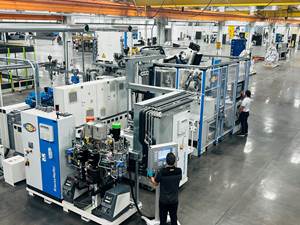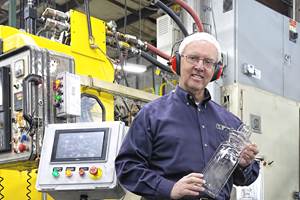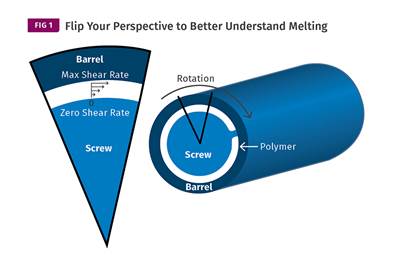Skills Gap Statistics Paint Alarming Picture
Many attendees in Orlando in a couple of weeks, walking the aisles and seeking out new equipment, materials and services will be taking a break from another very important search that consumes them back at their facilities: the search for people.
The Plastics Industry Association (PLASTICS) sized up the plight plastics firms face in its 2017 Size & Impact Study, noting that “While the skills gap and the decline of a qualified manufacturing workforce have been discussed for many years now, the nation has reached the point where their impacts will begin to be felt more acutely.”
In that report released in December, PLASTICS forecast that while employment in plastics manufacturing will expand .9%, .7% and .6% from 2017 to 2019, that rate is slower than the three prior years and five of the last six going back to 2011. Total employment in 2019 is forecast to reach 735,000, not including captive operations. It stands at 719,000 today.
Plastics is not alone in its search for workers. According to the Manufacturing Institute, 3.5 million manufacturing jobs will need to be filled in the next decade, but 2 million of those will remain vacant, as economic expansion and the retirement of baby boomers stoke a self-sustaining fire. According to the institute’s most recent survey, 35% of respondents believe a shortage of skilled workers will be the top impediment to growth next year.
University graduates will supply some new employees for plastics firms in need, albeit mostly only having classroom and lab skills versus shopfloor knowledge. David Kazmer, current chair of the University of Massachusetts Lowell’s plastics engineering program says current enrollments are at an all-time high. At the previous peak in the 1970s, Kazmer says approximately 50 to 60 students would graduate annually. The largest classes at this time—freshmen and junior years—have 75 students each with approximately 340 in total across the program.
Beyond UMass Lowell there are other plastics engineering programs in the U.S., but compared to other disciplines, the amount of plastics options in academia is disproportionately small compared to the number of people who eventually have to work with the material.
Online university database Cappex lists 13 schools with a polymer/plastics engineering major (although its list left of some well-known programs, including Ferris State and Pittsburg State). Across the U.S., only four of those have ABET (Accreditation Board for Engineering Technology) certification: UMass Lowell, University of Wisconsin Stout, Penn State Behrend and Pittsburg State University.
In 2015, appreciating the need to help people in industry working with plastics that were not educated in plastics, the American Injection Molding Institute (AIM) was created by Beaumont Technologies. David Hoffman, director/instructor, Plastics Education & Training at AIM, says that since that time 63 students have graduated from its Plastics Technology & Engineering (PTE) Certificate program, which achieved ANSI accreditation in December 2017, with three more classes currently in progress. That combined with the hundreds of plastics engineering degrees awarded offers some relief, but what if more engineering programs offered more than a chapter or lecture or two on plastics.
In 2015, 35,730 mechanical engineering degrees were awarded in the U.S., according to DataUSA. How many of those know a thermoplastic from a thermoset? “We take an informal poll every class,” Hoffman says. “We say, ‘O.K.—how many people have actually gone to school for plastics?’ Rarely do people raise their hands, and yet, these people are working in the plastics industry, and nobody has told them anything.”Related Content
KraussMaffei and NIAR Propel Injection Molded Thermoplastic Composites
The maker of plastics processing equipment has placed a machine and an injection molding expert in NIAR’s ATLAS lab in Wichita, Kansas, to help molding, composites and aerospace take off.
Read MorePlastics Processors Who Hire ‘Second-Chance’ Workers Do Well by Doing Good
Two blow molders with long-standing programs of hiring formerly incarcerated low-level offenders have helped these individuals re-enter their communities and have benefited from an additional resource during chronic labor shortages.
Read MoreTeaching Kids About the ‘Magic’ of Manufacturing
Making something out of (almost) nothing is an ‘eye opener’ for youngsters in their first exposure to plastics processing.
Read MoreEducation at NPE2024: 3D Printing Workshop
Learn about the emerging possibilities for part production via 3D printing/additive manufacturing.
Read MoreRead Next
People 4.0 – How to Get Buy-In from Your Staff for Industry 4.0 Systems
Implementing a production monitoring system as the foundation of a ‘smart factory’ is about integrating people with new technology as much as it is about integrating machines and computers. Here are tips from a company that has gone through the process.
Read MoreUnderstanding Melting in Single-Screw Extruders
You can better visualize the melting process by “flipping” the observation point so that the barrel appears to be turning clockwise around a stationary screw.
Read MoreAdvanced Recycling: Beyond Pyrolysis
Consumer-product brand owners increasingly see advanced chemical recycling as a necessary complement to mechanical recycling if they are to meet ambitious goals for a circular economy in the next decade. Dozens of technology providers are developing new technologies to overcome the limitations of existing pyrolysis methods and to commercialize various alternative approaches to chemical recycling of plastics.
Read More







.png;maxWidth=300;quality=90)


















